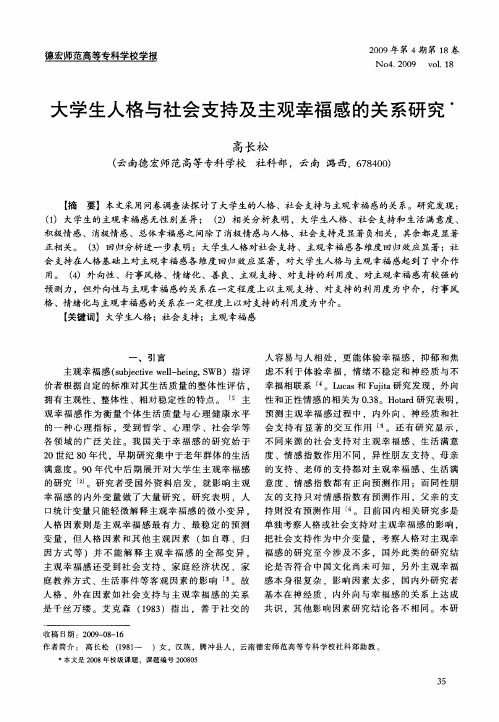主观幸福感与人格关系的研究
- 格式:pdf
- 大小:145.96 KB
- 文档页数:3


大学生主观幸福感与人格特质的相关研究摘要从心理学角度看,主观幸福感是评价者遵照本身拟定的尺度对其生存质量的整体性评估,是能综合权衡自我生存质量的主要心理指标,反映特定群体对生活状况的惬意程度【1】。
大学生的主观幸福感状况反映大学生的生活质量,对其身心健康及其发展具有重要意义,而人格又是预测幸福感最稳定的因素之一[2]。
本研究旨在探究主观幸福感与人格之间的关系,探讨主观幸福感在性别、年级、专业上是否存在差异,总结大学生的幸福感近状。
研究得出以下结论:(1)大学生主观幸福感由身心健康与心态平衡、自我成长与价值目标、家庭氛围与人际适应、知足充裕与社会信心四个维度构成。
(2)总的来说,大学生的主观幸福感存在差异。
在自我发展与目标价值方面满意度越高的大学生,主观幸福感越高,不同性别、年级、专业的大学生主观幸福感有各自的特征差异。
其中女大学生的主观幸福感指数要略高于男生,但是男生和女生在主观幸福感各维度上不存在差异;大四学生的主观幸福感最高,大一学生的主观幸福感最低,但内部感觉不一致,即有的人认为幸福,有的人认为不幸福;艺术专业的学生主观幸福感最高,但内部感觉不一致,即有的人感觉很幸福,而有的人却感觉不幸福;文科专业的学生主观幸福感最低。
(3)人格因素影响着大学生的主观幸福感。
在宜人性和神经质维度上得分越高的大学生,主观幸福感越低;外倾性、开放性和尽责性均与大学生的自我成长和目标价值极其相关,即这些特质上得分高的大学生,其自我成长和目标价值感也较高。
关键词:大学生;主观幸福感;人格特质AbstractFrom the point of view of psychology, subjective well-being is evaluation in accordance with itself to develop the scale of the survival of the overall evaluation of the quality, main psychological index to weigh the quality of their lives, reflect the specific groups on the living conditions of the comfortable degree [1]. College Students' subjective well-being reflects the quality of life of college students, which is of great significance to their physical and mental health and their development, and personality is one of the most stable factors to predict happiness [2]. The purpose of this study is to explore the relationship between subjective well-being and personality,to explore whether there are differences in gender, grades and majors, and to sum up the happiness of college students. The results of the study are as follows: (1) college students' subjective well-being is composed of four dimensions: physical and psychological health and mental balance, self growth and value goals, family atmosphere and interpersonal adaptation, contentment and social confidence. (2) in general, there are differences in subjective well-being of College students. The higher degree of satisfaction of self development and objective value, the higher subjective well-being, the different gender, grade, professional college students' subjective well-being have their own characteristics. The female college student's subjective well-being sense index slightly higher than boys, but boys and girls in the subjective happiness sense of each dimension there is no difference; subjective well-being of senior students are the highest, freshm an students’subjective well-being is the lowest, but the internal perception of inconsistencies that some people think happiness, some people think it is not happiness; Art Major Students' subjective happiness sense was the highest, but the internal perception of inconsistencies, that some people feel very happy, and some people do not feel happy; liberal arts students subjective well-being sense is the lowest. (3) personality factors affect the subjective well-being of College students. In a pleasant and neuroticism scores higher college students, subjective happiness sense of lower; extraversion, openness and conscientiousness are with the college students self growth and the target value is extremely relevant, namely these traits scored high on the college students, the self growth and the target value is higher.Key words: College students Subjective well-being Personality traits1引言1.1主观幸福感的含义英文中,表达幸福感的词汇有许多,如:happiness,well-being,eudemonia,subjective等等。

中文摘要高尔基说世界上的一切光荣与骄傲都来自于母亲,作为家庭灵魂的母亲历来都被学者重视。
由于越来越多的女性选择做全职母亲,这一群体渐渐进入人们的视野。
当更多研究的焦点被放在全职母亲的孩子和家庭上时,有研究者注意到其实全职母亲本身就存在着其复杂性和特殊性,她们对幸福的主观感受深刻影响着孩子和家庭,因此本研究聚焦“全职母亲的人格类型(MBTI)与主观幸福感的关系研究”,旨在探讨全职母亲的人格类型特点及主观幸福感水平。
主要围绕三方面的问题展开: 第一,采用(MBTI)人格类型问卷调查分析全职母亲的人格特点。
本部分研究以中小学生的母亲为被试,通过对问卷进行数据分析。
结果显示,在中小学生的母亲中,有将近三成女性选择做全职母亲,其中一成以上的女性做全职母亲的年限在10年以上。
这部分女性人格类型的共同点都表现为对生活态度取向比较随性,不喜欢事先做好计划,而倾向于灵活、不受约束的生活方式。
并且在收集信息的方式上体现为偏爱使用感官知觉而不是分析判断。
第二,采用主观幸福感(SWB)问卷调查和分析全职母亲的主观幸福感水平。
结果显示,全职母亲的主观幸福感水平较非全职母亲稍低。
具体表现为二者的生活满意度没有差异,但是在积极情感与消极情感的得分上差异显著。
第三,通过对全职母亲人格类型与主观幸福感的关系进行数据分析,结果显示,外倾与知觉型的全职母亲生活满意度较其他人格类型的高。
知觉型的全职母亲对消极情感的体验程度更高。
同时全职年限超过10年的母亲较其他全职母亲更易体验到较高的积极情感.第四,通过个案分析,探讨全职母亲人格类型的动态表现对主观幸福感的影响。
分析结果发现,由于来自工作、同事等外界的客观刺激比非全职母亲少,全职母亲人格类型的劣势功能缺少机会发挥作用,同时主要精力都倾注在孩子和家庭上,这使得一向不擅长计划的全职母亲在面对突然事件时产生的情绪体验更强烈。
关键词:全职母亲;人格类型;主观幸福感;优势人格;劣势人格;ABSTRACTAll the glories and prides in the world come from mother, which was said by Gorki..Mother, as the spirit of the family, is paid much attention by scholars all the time. That’s why more and more females prefer to be stay-at home mother. So the group of stay-at home mother has come into our view gradually. When the research focuses on the influence that is brought to children and family by stay-at home mother, some researchers notice that there exists the complexity and particularity in stay-at home mother. That’s to say, their subjective well-being can influence their children and family. So I will focus my research on "the research between stay-at home mother’s psychological types and subjective well-being", in order to discuss stay-at home mother’s psychological types’ trait as well as happiness levels. My opinion is expatiated by following three aspects.Firstly, makea questionnaire survey of stay-at home mother’s psychological types’ trait. Some mothers who have their children studying in primary school and high school were tested. And then the data on the questionnaire was analyzed. The result shows that nearly 30 percent females choose stay-at home mother and over 10 percent in them have been stay-at home mother for more than 10 years. The common place occurred in these females is that they are inclined to live in random and enjoy flexible lifestyle without restriction rather than make a plan in advance. As well as about the manner of collecting information, they prefer the sensory perception to analysis.Secondly, make a questionnaire survey of stay-at home mother’s subjective happiness levels. The result shows that stay-at home mother has lower subjective happiness levels than non-stay-at home mother. There are no differences about their satisfaction for life between Stay-at-home mothers and non-stay-at home mother. But there are obvious differences about positive affect and negative affect between them.stay-at home mother feels happy, angry and despair more easily, that’s to say she has more fierce emotionexperience.Thirdly, analyze the influence that is brought to subjective well-being by stay-at home mother’s psychological types’ trend by interview in depth. The result shows that the function of weakness of personality in Stay-at-home mothers is inhibited unconsciously, because they have less stimulation from work, colleague outside than non-stay-at home mother. They put all their time and energy on their children and family at the same time. This results in that stay-at home mother who does n’t do well in planning is inclined to give birth to fierce emotion experience, happiness or sadness in the face of incidental affairs.Keywords:stay-at homemother,Psychological Types,Subjective Well-Being Advantages of personality,Weaknesses of personality承诺书承诺书本人郑重声明:所呈交的学位论文,是在导师指导下独立完成的,学位论文的知识产权属于山西大学。

大学生主观幸福感的研究综述摘要: 主观幸福感是个人根据自定的标准对其生活质量的总体评价。
大学生主观幸福感的状况是大学生生活质量的反映,对其身心健康及其发展都有积极影响,研究大学生主观幸福感具有重要意义。
本综述对主观幸福感念、结构、特点及研究的回顾与发展等进行了梳理,对大学生主观幸福感的研究基础进行了综合述评。
通过述评,一方面对大学生主观幸福感研究进行综合评价,丰富和深化大学生主观幸福感研究;另一方面有助于改善大学生的生活质量,提高他们对各生活领域的满意度,让他们体验到更多的积极的心理状态,塑造他们良好的心理素质。
关键词: 大学生; 主观幸福感; 综述目录主观幸福感的研究概述 (2)国内外主观幸福感的研究进展 (2)三 (2)大学生主观幸福感的测量工具 (3)五、影响大学生主观幸福感的因素 (3)六、 (4)主观幸福感的研究概述主观幸福感研究大致自20世纪50年代在美国兴起,80年代中后期开始进入我国研究者的视野,主观幸福感(Subjective Well-being,简称SWB)是指个体依据自定的标准对其生活质量的整体的评价。
这是Diener(1984)提出来的在心理学界得到公认的概念. 它包括生活满意度和情绪体验两个基本成分,前者是个体对生活总体质量的认知评价,即在在总体上对个人生活做出满意判断的程度;后者是指个体生活中的情绪体验,包括积极情绪(愉快、轻松等)和消极情绪(抑郁、焦虑、紧张等)两方面.主观性、整体性、相对稳定性是SWB有三个特点。
国内外主观幸福感的研究进展1.国外主观幸福感的研究进展国外对主观幸福感的研究以Wilson(1967)撰写的第一篇综述《自称幸福的相关因素》为标志。
Diener(1997)在其论文《主观幸福感研究新纪元》中,把西方幸福感研究划分出描述比较、理论建构、测量发展三个主要的发展阶段。
第一阶段主要是集中在人口统计学的维度,描述与比较不同人群幸福感; 第二个阶段主要是将研究重点转向内部因素,建构有关的理论框架,探讨获得幸福的各种途径和跨文化研究; 第三个阶段主要是将研究方法、途径和主观幸福感测量的理论进行整合,形成了以自陈量表为主体,并结合其他评估技术,以正面评价为主,并兼顾负面指标的新格局。


大学生主观幸福感的影响因素研究二、文献综述在心理学和社会学领域,主观幸福感一直是重要的研究课题。
对于大学生这一特定群体,其主观幸福感受到诸多因素的影响,这些因素涵盖了个人、家庭、学校、社会等多个层面。
个人因素方面,大学生的性格特质、自我认知、自尊水平等都会对其主观幸福感产生显著影响。
例如,积极心理学认为,个人的积极情绪和乐观态度能够增强主观幸福感。
个人的目标设定和成就动机也会对幸福感产生重要影响。
当大学生能够设定明确的目标,并在学习和生活中不断取得进步时,他们的主观幸福感往往会得到提升。
家庭因素方面,家庭环境、父母的教育方式以及家庭经济状况等都会对大学生的主观幸福感产生影响。
例如,研究表明,来自支持性和睦家庭的大学生往往具有更高的主观幸福感。
父母的教育方式,如民主型教育,有助于培养大学生的自主性和创造性,从而提高他们的主观幸福感。
学校因素方面,校园环境、师生关系、教学质量以及课外活动等都可能对大学生的主观幸福感产生影响。
良好的校园环境和师生关系有助于增强大学生的归属感和满足感,从而提高他们的主观幸福感。
同时,高质量的教学和丰富的课外活动也能激发大学生的学习兴趣和热情,进而提升他们的主观幸福感。
社会因素方面,社会支持、文化价值观、就业压力等都会对大学生的主观幸福感产生影响。
例如,社会支持网络的广泛和稳定可以为大学生提供情感支持和物质帮助,从而增强他们的主观幸福感。
同时,积极的社会文化价值观也可以引导大学生形成健康的生活态度和价值观,提高他们的主观幸福感。
大学生的主观幸福感受到多种因素的影响。
未来的研究可以进一步探讨这些因素之间的相互作用机制,以及如何通过综合干预来提高大学生的主观幸福感。
同时,针对不同类型的大学生(如不同性别、年级、专业等),也可以开展更加细致深入的研究,以提出更具针对性的建议和措施。
1. 主观幸福感的概念和测量方法主观幸福感(Subjective Wellbeing,SWB)是一个多维度、综合性的心理概念,主要描述个体对生活的整体满意度以及积极情感和消极情感的平衡状态。
人格与主观幸福感的关系述评及启示人格与主观幸福感之间存在着密切的关系。
人格是指个体在长期发展过程中形成的个体差异的稳定模式和特点,而主观幸福感是指个体对自己生活满意度的主观体验。
人格塑造了个体的价值观、态度、行为方式和应对策略等方面,从而影响了个体对幸福的感受和满意度。
人格特质与主观幸福感存在着紧密联系。
研究表明,积极、乐观、自尊心强的人更容易拥有较高的主观幸福感,而消极、悲观、自卑的人则往往主观幸福感较低。
这是因为积极的人格特质使个体更有自信、更愉悦,能更好地应对生活中的挑战和困难,从而拥有更高的幸福感。
人格特质也影响个体对幸福感来源的认知。
不同的人格特质使个体对幸福感的来源有不同的认知和评价。
外向型的人更重视社交关系和与他人的互动,他们会从与他人的交往中获取更多的幸福感;内向型的人则更重视内在的情感体验和个人成长,他们会从个人发展中获得更多的幸福感。
人格特质与个体的目标设置和追求方式有关。
不同的人格特质会影响个体追求什么样的目标和采取什么样的行为方式。
外向型的人通常更有竞争意识,更愿意追求外部的权力、地位和财富,而内向型的人则更注重内在的价值和个人成长。
个体追求自己理想目标的满足程度会直接影响到他们的主观幸福感。
人格特质也影响个体的应对方式和心理弹性。
积极、乐观的个体往往更具有应对挫折和逆境的能力,他们更倾向于积极寻求解决问题的办法,更容易从困境中恢复并保持较高的幸福感。
而消极、悲观的个体往往更易陷入抑郁和焦虑的情绪中,从而难以获得持久的幸福感。
从人格与主观幸福感的关系中我们可以得到一些启示。
个体可以通过培养积极、乐观的人格特质来提升自己的主观幸福感。
培养乐观的态度、建立良好的自尊心,可以使个体更愉悦、更有自信地面对生活中的种种困难。
个体应该尽量将自己的目标和价值观与自己的人格特质相匹配。
了解自己的人格特质,明确自己的目标和价值观,可以帮助个体更好地选择适合自己的生活方式和追求方式,从而更大程度地获得幸福感。